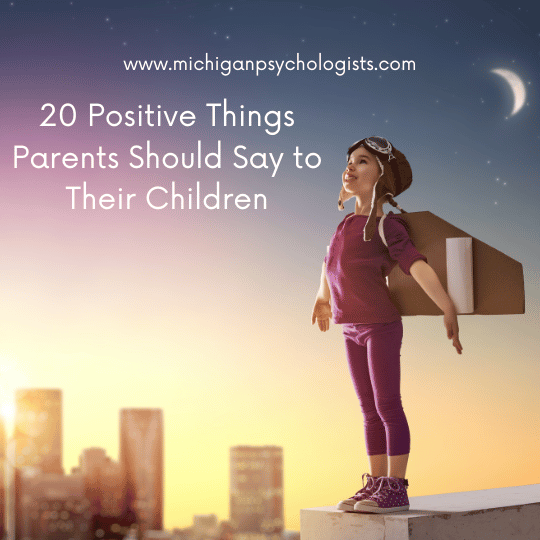20 Positive Things Parents Should Say to Their Children

Table of Contents
Positive reinforcement and affirming language play a crucial role in a child’s development. By consistently offering supportive and encouraging words, parents and caregivers can foster a sense of security, self-esteem, and resilience in their children. Here are 20 positive things to say to your child, each explained with its importance and benefits to the child’s development and mental health.
20 Positive Things to Say to Your Child: Building Confidence and Emotional Well-Being
1. You are so helpful, thank you
Why It’s Important: Acknowledging a child’s helpfulness promotes a sense of responsibility and pride.
Benefits: Boosts self-esteem, encourages cooperative behavior, and reinforces the value of contributing to others.
2. You have great ideas
Why It’s Important: Recognizing a child’s creativity and thinking skills validates their intelligence and innovation.
Benefits: Encourages critical thinking, fosters creativity, and builds confidence in their ability to solve problems.
3. I’m so proud of you
Why It’s Important: Expressing pride in a child’s efforts and accomplishments reinforces their sense of worth.
Benefits: Enhances self-esteem, motivates them to strive for goals, and strengthens the parent-child bond.
4. Even if you make a mistake, you can fix it
Why It’s Important: Teaching children that mistakes are opportunities for learning helps build resilience.
Benefits: Encourages a growth mindset, reduces fear of failure, and promotes problem-solving skills.
5. Our family is so blessed to have you in it
Why It’s Important: Making a child feel valued within the family unit fosters a strong sense of belonging.
Benefits: Strengthens family bonds, enhances emotional security, and promotes positive self-image.
6. That’s a great question
Why It’s Important: Validating a child’s curiosity encourages intellectual development and inquisitiveness.
Benefits: Stimulates learning and exploration, reinforces the value of asking questions, and boosts confidence in their thinking.
7. I’m so excited to spend time with you
Why It’s Important: Showing enthusiasm for spending time with your child makes them feel loved and important.
Benefits: Strengthens the emotional connection, boosts self-worth, and promotes a positive relationship.
8. That was so brave, what you just did
Why It’s Important: Acknowledging acts of bravery helps children recognize and appreciate their own courage.
Benefits: Builds self-confidence, encourages risk-taking within safe boundaries, and promotes resilience.
9. You make my heart feel so full
Why It’s Important: Expressing deep emotional gratitude makes children feel cherished and loved.
Benefits: Enhances emotional security, strengthens the parent-child bond, and boosts overall happiness.
10. Not everyone will like you, and that’s okay
Why It’s Important: Teaching children about acceptance and resilience in the face of rejection is crucial for their emotional health.
Benefits: Promotes self-acceptance, reduces anxiety about social approval, and fosters resilience.
11. Your attitude can change any situation
Why It’s Important: Emphasizing the power of a positive attitude encourages children to approach challenges optimistically.
Benefits: Enhances problem-solving skills, promotes a positive outlook, and builds resilience.
12. That was a really good choice
Why It’s Important: Recognizing good decision-making reinforces a child’s ability to make responsible choices.
Benefits: Encourages independent thinking, builds self-confidence, and promotes responsible behavior.
13. It’s your decision
Why It’s Important: Empowering children to make their own decisions fosters independence and responsibility.
Benefits: Builds confidence, encourages independent thinking, and promotes a sense of control over their lives.
14. Don’t give up, I know you can do this
Why It’s Important: Encouraging persistence helps children develop a strong work ethic and determination.
Benefits: Builds resilience, promotes a growth mindset, and enhances problem-solving abilities.
15. I believe you
Why It’s Important: Showing trust in your child validates their feelings and experiences.
Benefits: Enhances self-worth, strengthens trust, and promotes open communication.
16. Don’t compare yourself to anyone else, you are enough just the way you are
Why It’s Important: Encouraging self-acceptance helps children appreciate their unique qualities.
Benefits: Reduces anxiety, boosts self-esteem, and promotes a healthy self-image.
17. I love how you said that
Why It’s Important: Praising a child’s communication skills reinforces their ability to express themselves effectively.
Benefits: Builds confidence in communication, encourages clear expression, and strengthens language skills.
18. Your smile is so beautiful
Why It’s Important: Complimenting a child’s appearance in a positive, non-critical way promotes self-esteem.
Benefits: Enhances self-image, promotes a positive outlook, and boosts confidence.
19. You’re such a lovely friend
Why It’s Important: Acknowledging a child’s social skills and kindness encourages positive social behavior.
Benefits: Builds self-esteem, promotes empathy, and strengthens social connections.
20. I love holding your hand
Why It’s Important: Physical affection combined with verbal affirmation strengthens emotional bonds.
Benefits: Enhances emotional security, promotes physical closeness, and strengthens the parent-child relationship.
Positive affirmations and supportive language are essential tools in nurturing a child’s emotional and psychological development. By consistently using encouraging words and recognizing their efforts and qualities, parents and caregivers can significantly impact a child’s self-esteem, resilience, and overall mental health. These 20 affirmations provide a foundation for fostering a loving, supportive, and growth-oriented environment that helps children thrive.